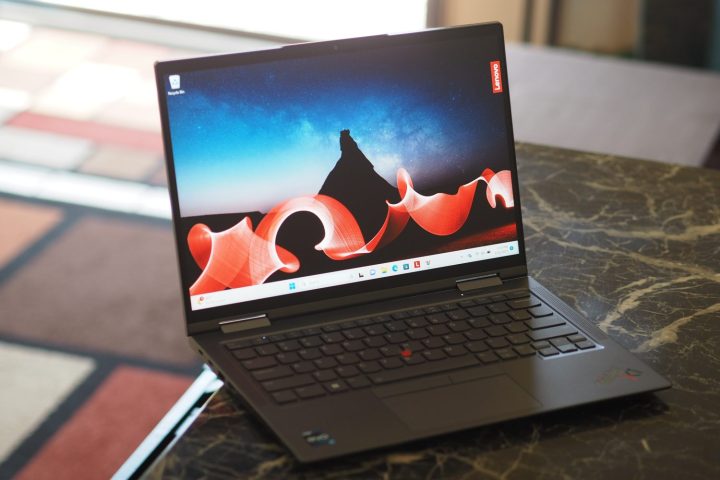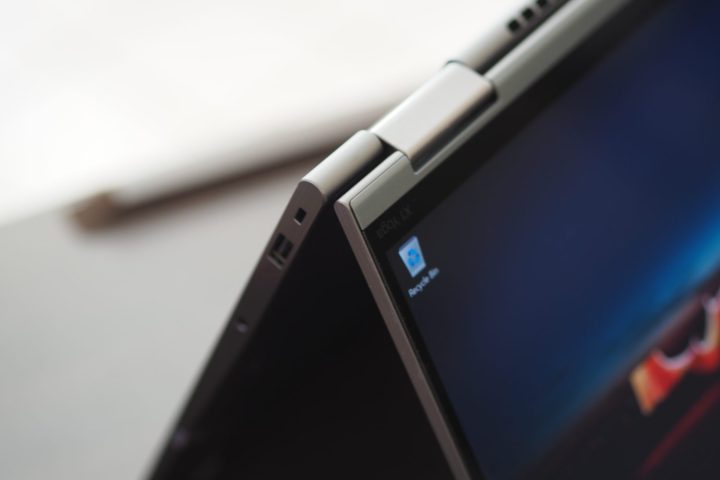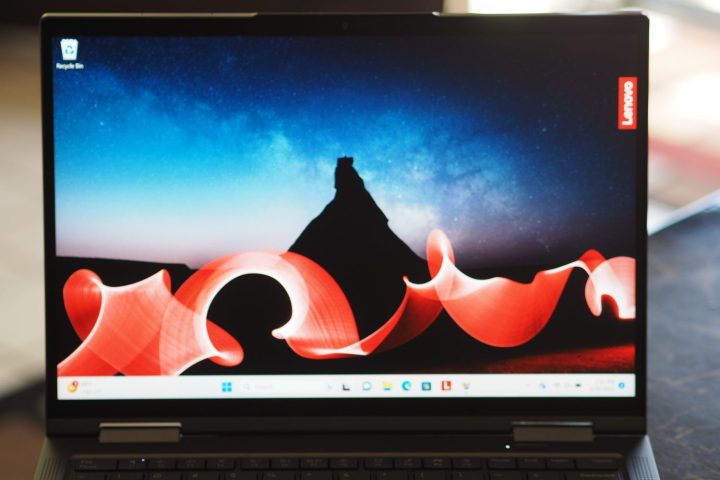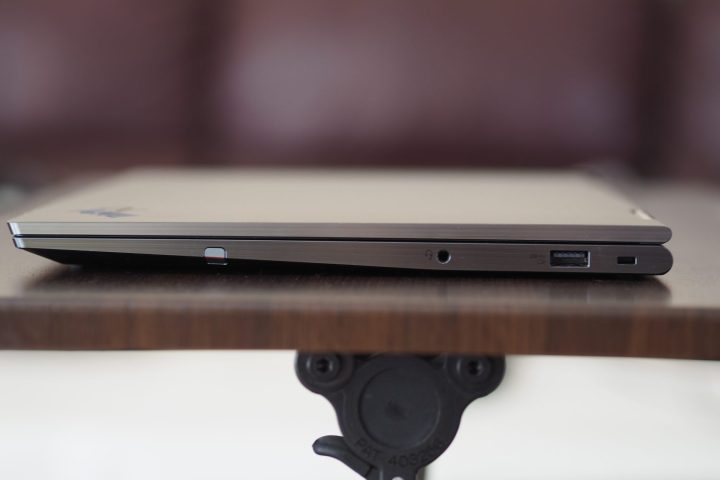The ThinkPad X1 Yoga is Lenovo’s business-oriented 360-degree 2-in-1 laptop. I underwent a significant upgrade in its 6th generation, with the ThinkPad X1 Yoga Gen 7 model upgrading the components for faster speeds and better battery life. Now, Lenovo has released the 8th generation, and again it switches up the internals and leaves the external chassis alone.
But the changes in CPUs weren’t simply an upgrade to the 13th-gen versions of the previous model’s processors. Instead, Lenovo switched to 13th-gen low-power CPUs in most configurations. Was this an upgrade or a downgrade for this well-built business machine?
Specs and configurations
| Lenovo ThinkPad X1 Yoga Gen 7 | Lenovo ThinkPad X1 Yoga Gen 8 | |
| Dimensions | 12.38 inches x 8.75 inches x 0.61 inches | 12.38 inches x 8.75 inches x 0.61 inches |
| Weight | 3.0 pounds | 3.0 pounds |
| Processor | Intel Core i5-1250P Intel Core i7-1260P Intel Core i7-1270P |
Intel Core i5-1335U Intel Core i5-1345U Intel Core i7-1355U Intel Core i7-1365U Intel Core i7-1370P |
| Graphics | Intel Iris Xe | Intel Iris Xe |
| RAM | 8GB LPDDR5 16GB LPDDR5 |
16GB LPDDR5 |
| Display | 14.0-inch WUXGA (1920 x 1200) IPS 14.0-inch WQUXGA (3840 x 2400) OLED |
14.0-inch WUXGA (1920 x 1200) IPS 14.o-inch WUXGA IPS with ePrivacy Filter 14.0-inch WQUXGA (3840 x 400) OLED |
| Storage | 256GB PCIe SSD 512GB PCIe SSD 1TB PCIe SSD 1TB PCIe Gen 4 SSD |
256GB PCIe Gen 4 SSD 512GB PCIe Gen 4 SSD 1TB PCIe Gen 4 SSD 2TB PCIe Gen 4 SSD |
| Touch | Yes | Yes |
| Ports | 2 x USB-C with Thunderbolt 4 2 x USB-A 3.2 Gen 1 1 x HDMI 2.0b 1 x 3.5mm audio jack 1 x Nano SIM slot (on WWAN models) |
2 x USB-C with Thunderbolt 4 2 x USB-A 3.2 Gen 1 1 x HDMI 2.0b 1 x 3.5mm audio jack 1 x NanoSIM slot (on WWAN models) |
| Wireless | Wi-Fi 6E and Bluetooth 5.2 | Wi-Fi 6E and Bluetooth 5.1 |
| Webcam | 1080p with infrared camera for Windows 11 Hello | 1080p with infrared camera for Windows 11 Hello |
| Operating system | Windows 11 | Windows 11 |
| Battery | 57 watt-hours | 57 watt-hours |
| Price | $2,650+ | $2,650+ |
Lenovo’s pricing and configuration can be all over the map and constantly changes. So it’s hard to nail down sometimes. But, we can say that the ThinkPad X1 Yoga Gen 8 maintains the premium price of its predecessor, starting out at $2,650 on Lenovo’s website with an Intel Core i5-1335U, 16GB of RAM, a 256GB SSD, and a 14.0-inch WUXGA (1920 x 1200) IPS display.
Max it out with a Core i7-1370P, 16GB of RAM, a 2TB SSD, and a WQUXGA (3840 x 2400) OLED display and you’ll spend $3,113. Chances are you can find a Gen 7 model for less money if you shop around, but it’s currently listed at the same starting price in the Lenovo store with just 8GB of RAM. So far, Lenovo is only offering the Gen 8 with 16GB of RAM.
Design

The ThinkPad X1 Yoga last received a major design upgrade in its 6th-gen model, meaning that the Gen 7 and Gen 8 machines are essentially identical except for the components inside. That design upgrade was a major one, resulting in a laptop that’s incredibly well-built and offers an aesthetic that doesn’t mimic the iconic all-black ThinkPad look but offers up enough reminders that it’s still identifiable at a distance.
You’ll also enjoy the ThinkPad X1 Yoga’s keyboard regardless of which generation you pick, because it hasn’t changed either. It offers plenty of travel, sculpted keycaps that are large and well-spaced, and switches that offer just slightly more resistance than many modern keyboards but provide snappy feedback. The touchpad is rendered a little smaller than it could be thanks to the buttons serving the TrackPoint nubbin in the middle of the keyboard, but it’s responsive with firm, quiet clicks.
Connectivity also hasn’t changed, with a good mix of future-proofed and legacy ports. Wireless connectivity is also up to date, although for some reason the Bluetooth radio underwent a downgrade in the latest version.
Both models have 1080p webcams, and both have infrared cameras for Windows 11 Hello support. You can also log in without a password using a fingerprint reader embedded in the power button on both generations.
Performance

The ThinkPad X1 Yoga Gen 7 utilized primarily 28-watt Intel 12th-gen CPUs, and we tested it with the Core i7-1260P. That’s a 12-core (four Performance cores at 4.7GHz and eight Efficient cores at 3.4GHz), 16-thread CPU. The Yoga didn’t perform as well as some other laptops using the same chip, especially in performance mode.
For the 8th-gen models, Lenovo switched largely to lower-power CPUs including the 15-watt Core i7-1355U, which I tested. That CPU has just 10 cores (two Performance cores at 5GHz and eight Efficient cores at 3.7GHz) and 12 threads, although the individual cores run at faster clock speeds. You can configure the Gen 8 model with 28-watt 13th-gen processors with Intel’s vPro technology for enhanced enterprise security and manageability, which was also an option (with 12th-gen CPUs) with the Gen 7 model.
In our CPU-intensive benchmarks, the Gen 8 model performed faster in single-core mode and in performance mode than the Gen 7 model. Clearly, the switch to lower-powered CPUs didn’t have a negative effect on the laptop’s performance, likely because the thin and light machine is thermally throttled in any event. If you opt for the high-end Gen 8 with P-series processors, you’ll likely get significantly faster performance.
| Lenovo ThinkPad X1 Yoga Gen 7 (Core i7-1260P) |
Lenovo ThinkPad X1 Yoga Gen 8 (Core i7-1355U) |
|
| Geekbench 5 (single/multi) |
Bal: 1,650/8,080 Perf: 1,621/8,544 |
Bal: 1,835/6,220 Perf: 1,788/8,629 |
| Handbrake (seconds) |
Bal: 118 Perf: 134 |
Bal: 184 Perf: 110 |
| Cinebench R23 (single/multi) |
Bal: 1,587/7,682 Perf: 1,611/8,078 |
Bal: 1,644/5,684 Perf: 1,858/8,890 |
| PCMark 10 Complete (higher is better) |
5,537 | 5,401 |
Display

You get a few display choices with the ThinkPad X1 Yoga, and they’re mostly the same between generations. I couldn’t find a privacy screen option on the Gen 7 model, so that might be new with the Gen 8. We tested both generations with the low-power Full HD+ (1920 x 1200) IPS panels and they were both fine examples of the technology. The Gen 7 panel did have slightly wider and more accurate colors, but the Gen 8 display was brighter.
Once again, there doesn’t seem to be a distinct advantage for either generation.
| Lenovo ThinkPad X1 Yoga Gen 7 (IPS) |
Lenovo ThinkPad X1 Yoga Gen 8 (IPS) |
|
| Brightness (nits) |
386 nits | 423 |
| AdobeRGB gamut | 100% | 100% |
| sRGB gamut | 81% | 76% |
| Accuracy (DeltaE, lower is better) |
0.78 | 1.49 |
| Contrast ratio | 1,900:1 | 1,710:1 |
The Gen 8 model retains the same four-speaker setup as the Gen 7 model, with two upward-firing speakers flanking the keyboard and two downward-firing speakers at the front bottom of the chassis. As with the previous model, the Gen 8 version provides plenty of volume with clear mids and highs and just a touch of bass. It’s fine for everything but streaming and audio, where a good set of headphones or external speakers will be welcome.
Portability

The chassis was unchanged in all its dimensions, and the Thinkpad X1 Yoga remains a nicely thin and light 2-in-1. Its display bezels aren’t the smallest so it’s a tiny bit wide and deep, but it’s very thin at 0.61 inches and light at 3.0 pounds.
Even though Lenovo switched to low-power CPUs in the newest generation, battery life remained roughly the same in two of our benchmarks. The Gen 8 model did have significantly better battery life in the PCMark 10 Applications battery benchmark, with more of an increase over the web browsing results than we typically see. Overall, that’s a good thing, because the Gen 7 model provided close to all-day battery life if you didn’t push the CPU too hard. The Gen 8 model will do the same.
| Lenovo ThinkPad X1 Yoga Gen 7 (Core i7-1260P) |
Lenovo ThinkPad X1 Yoga Gen 8 (Core i7-1355U) |
|
| Web browsing | 10 hours, 10 minutes | 10 hours, 24 minutes |
| Video | 16 hours, 12 minutes | 15 hours, 12 minutes |
| PCMark 10 Applications | 10 hours, 33 minutes | 15 hours, 29 minutes |
Conclusion
There’s very little real difference between these two generations. They perform similarly, get roughly the same battery life, enjoy identical build quality, and look exactly the same. Their keyboards and touchpads are identical, and other than what appears to be a new privacy option you can get the same displays on both.
That’s why our recommendation is to look for last year’s model, the Gen 7 model, at a reduced price. You’ll need to shop around because Lenovo isn’t offering any discounts at this point on their site. But if you can find the older machine for a lot less money, then you’ll be getting a true bargain without any meaningful compromises.
Editors’ Recommendations
Services Marketplace – Listings, Bookings & Reviews